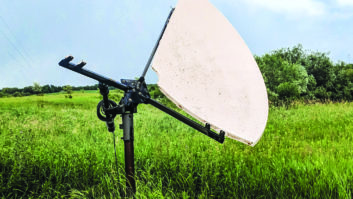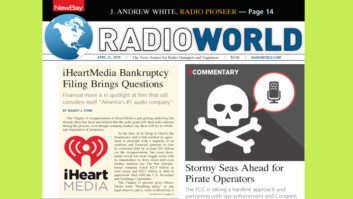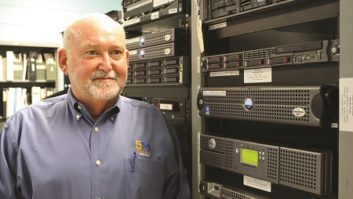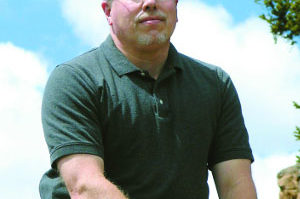If your goal is to be paid better for your work as a broadcast engineer, look the part.
As an employee or contractor, you wish to be perceived as part of the management team of the business that’s paying the bills. I worked at this and it paid off at my successful contracting business for over 40 years.

You’ve seen them — engineers with long unmanaged beards, uncombed hair and untied shoes. Managers tolerate them but often do not fully appreciate them or compensate them for their technical skill. These engineers degrade themselves and their trade through a lack of professionalism.
If you have a beard, keep it short and neatly trimmed.
Clients hired me because I looked and acted like them. I bathe daily, cut my hair and dress in clean clothes. When on the job, I never wore the same clothes two days in a row and never put on shirts or hats with advertising or written statements. I didn’t give a customer a reason to think of me as anything but a professional. (I do have a tie showing 1930s vacuum tubes, as well as a Nautel T-shirt with a Smith chart, worn to SBE gatherings.)
My wife Paula’s advice is, “Tuck in your shirt, pull up your pants, polish your shoes and tie your shoestrings.” Women and managers notice things like that.
As a contractor, I was not salaried; repeat business relied on happy clients. The proof was in the pudding. I was called to do work again and again because clients appreciated my previous work.
Some of these lessons I learned while serving with the U.S. Army in Vietnam in the late 1960s. My job was to run an aircraft avionics repair shop, to “keep ’em flying.” We were winning when I left!
Your job as a broadcast engineer is to keep ’em broadcasting.
ON THE JOB
Sweep the engineering area of your studios regularly. The same applies to transmitter sites. Keep workbenches tidy and ready for the next repair job. It’s not demeaning to be a maintenance person. A messy office or shop sends a message to management that you are a disorganized person; that’s bad for your reputation.

The same goes for your car. It doesn’t need to be fancy or expensive, but it should be clean inside and out.
Do the best work you can and be sure to document that work so the next engineer doesn’t speak poorly of you. Funny how those things can come back to bite you.
Managers typically know little of what you do; don’t give them a reason to doubt that you’re doing what is best. Put the job first. Always show up on time for appointments. Being late wastes people’s time and is a chink in your armor.
Good friend and broadcast engineer Shane Toven once told me, “Don’t say anything if you can’t say something good,” a a great philosophy. Be a good listener. Do more listening than talking, even if it is not in your nature. You might even learn something.
Don’t wear dark glasses when communicating with others, even outdoors. Eye contact is so important; lack of it will cause distrust. You can put the sunglasses back on after the meeting.
Don’t mumble; speak clearly and distinctly. Don’t use slang or swear. Use real, everyday words to relate your thoughts effectively.
Don’t use technical mumbo jumbo that makes a client’s eyes glaze over. Jump past ohms and volts to tell the client how you are working on a difficult problem to make the station whole again. Give technical details only if asked. He or she wants to hear that you are making best use of the resources available.
Avoid talk about politics. You are sure to disagree with someone. Political discussions are divisive and can be bad for relations even if the other person is of your political persuasion. Politics is a personal philosophy, not a business agenda.
Don’t chew tobacco or smoke while conversing with a client. Don’t take calls or text messages during a meeting. Give your full attention to what is going on in front of you at that moment.
TAKE NOTES
Even as a retired person, I keep paper in my shirt pocket with a pen to write things down, so I don’t forget important information.
That same piece of paper contained reminders for me to update the boss on projects and ask questions on how to proceed. I didn’t have to go back later to say, “I forgot to ask you …” Remember, you do yourself a disfavor by ignoring good business professionalism.
SBE
You should be a member of the Society of Broadcast Engineers, ideally with certification.

When your employer/client suggests a date for a job, you might say you were planning on attending an SBE meeting to update your skills on that day. That person might be impressed that you actually care about your profession.
The added benefit is you will learn more about the broadcast industry at SBE meetings.
EMAILS
When sending emails or other correspondence, avoid starting sentences with the word I. Best to use a few words ahead of “I” so you don’t bill yourself as the center of the universe. Professional writers redo executive dispatches to avoid mistakes like that.
Use your first and last name in the “from” field on all emails. There might be four Jims known to the person you are conversing with. Avoid confusion by being specific.
Your signature line should include a title like Broadcast Engineer. An SBE certification logo can go here, too.
If your email has an icon photo, make it a good one, not some abstract, jerky thing.
Do not type in all upper case. It makes you look like you are shouting.
Be clear and concise, keeping word count to a minimum. Detailed discussions are for communicating with other engineers, not management.
SOCIAL MEDIA
Be careful what you say on a website, blog and Facebook, etc. The whole world is watching. Best not to do or say something stupid that you’ll regret. Bad humor can ruin you.
No one is perfect, but do what you can to win respect from others. Respect can’t be demanded but is earned by your actions.
Sorry if some of this sounds negative. I am just trying to help you have a professional stance for best success in your job.
The Rotary service organization has a wonderful four-way test:
1. Is it the truth?
2. Is it fair to all concerned?
3. Will it build goodwill and better friendships?
4. Will it be beneficial to all concerned?
Present yourself well for the best outcome. It makes perfect sense.
Mark Persons, WØMH, is an SBE Certified Professional Broadcast Engineer. He and his wife Paula are retired after more than 40 years in business. His website is www.mwpersons.com.











